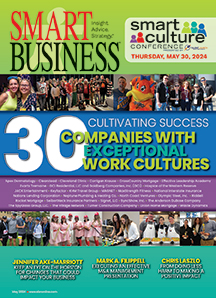Craft your message carefully. No. 1, executives should not underestimate the knowledge that employees have for their business.
No. 2, employees will see right through a sales pitch as opposed to a candid, clear, fact-based communication. In today’s world, you just need to be very candid, very clear, very concise, very fact-based.
… If you’re having cutbacks, you need to know that that’s on people’s minds every day. If you’re having salary cuts or if you’re having growth and you’re hiring, what does that mean?
It’s very important when you go into the town-hall meetings that you understand what’s on their mind, that you tailor your presentation to the audience of both what they would like to know about the business and what their concerns are, both corporately and individually. And make sure you address them, don’t dance around them.
The town-hall meetings are to do the best I can to update our team on what are the challenges we’re facing and the opportunities in both the economy and the industry.
Then ask for comments, feedback, advice, recommendations. These town-hall meetings can last an hour-plus. They’re meant to be a very two-way communication.
Outline expectations upfront. Every single meeting, I start the meeting off that this is a two-way conversation, that they can stop me at any time and ask a question. We can debate together. Someone might ask a question, have a complaint or a concern, and someone else might think the exact opposite. And so we certainly allow that conversation internally to be very open and very candid.
Set the tone at the beginning of every meeting that this is not a lecture presentation, this is a dialogue, this is a conversation we’re going to have together for the next half-hour, 45 minutes or hour depending on the schedules and subjects to be covered at that point.
Give employees time to be candid. It usually doesn’t happen the first meeting. People are usually trying to get a sense for the environment. …
If they ask a question, and it might be a little different, how are they communicated with both during and after the meeting? It’s a process of developing trust and confidence.
I’m a firm believer that any question or any comment is fair with no reciprocity as long as it’s not a mean-spirited question — as an example, attacking a co-worker or criticizing a client. But if it’s a professional question that is asked in the right spirit, then they can ask any question, they can criticize anything about the company, and there will be no reciprocity toward them.
But that doesn’t happen in the first meeting. You’ve got to develop trust and develop a relationship. … It happens over time that they become very effective formats for communicating two ways.
How to reach: Direct Group, (856) 241-9400 or www.directgroup.net

